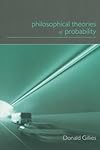

Click on a thumbnail to go to Google Books.
|
Loading... Philosophical Theories of Probabilityby Donald Gillies
 None No current Talk conversations about this book.   ) )Starts with Laplace's classical theory of probability, which took for granted that the universe was deterministic even in its smallest parts (following Newton's success with astronomy and an unwarrented inference to the microscopic world). Thus he understood probability as a measure of human ignorance. He also believed the calculus of probabilities has as its foundation equi-probable events---but what about biased die, eg? Interestingly, there's some disagreement about how classical theorists thought about probability. Hacking, Gillies says, believes that they understood it as both epistimic (subjective) and aleatory (objective). Lorraine Daston disagrees, and thinks they collapsed the two because they understood the subjectivity to be that of a reasonable man, who tracked the objective probability---or something. (From her 1988 book.) Laplace considered this puzzle: suppose you're told a die is biased. What's the chance it land heads? Subjectively the answer is 1/2. Objectively it's anything but. Laplace favored the subjective result. Why didn't the ancients hit on probability theory? Gillies thinks it might have something to do with the fact that most of their games of chance that used a die, used an irregular die, such as an astralagi (an animal's knucklebone). Next up is the logical theory. Keynes's view on probability was heavily influenced by Russell's Principle of Mathematics and G.E. Moore's Principia Ethica (yes, that's right: a work on ethics). Gillies muses that Keynes may have sought to undermine the application of probability in Moore's work because he used it to support conventional morality---something Keynes didn't like because he was a homosexual! (Yes, Gillies really says that, and no he doesn't elaborate on how Keynes's logical theory would undermine Moore's conclusions.) Has a nice quote from Keynes re conditional probability: 'No proposition is in itself either probable or improbable, just as no place can be intrinsically distant; and the probability of the same statement varies with the evidence presented, which is, as it were, its origin of reference.' (1921) For Keynes probability is the degree of partial logical entailment. Keynes himself describes it as a somewhat neo-Platonic idea, that we just have some direct knowledge of certain logical relations, which we can clarify and extend, giving us probability theory as he understood it. Keynes insisted that there were nonmeasurable probabilities, resulting in partial orderings and funny-looking diagrams. (Gillies doesn't spell out his motivation for that. I'd like to know.) Keynes believes that numerical probabilities must be based on equiprobable events---like Laplace did---and further states that that requires the Principle of Indifference. Gillies describes several paradoxes that are raised by the Principle of Indifference. He finds Keynes's proposed solutions unsatisfactory and records that many others did also. Jaynes believes that it can be defended by the smashing success it has had when deployed in the physics of gases and other areas, but Gillies (I think correctly---and this is something Hacking has pointed out) observes that QM physics decisively confounds the principle since there are cases where probabilities don't add as you might expect. no reviews | add a review
Belongs to Series
The Twentieth Century has seen a dramatic rise in the use of probability and statistics in almost all fields of research. This has stimulated many new philosophical ideas on probability. Philosophical Theories of Probability is the first book to present a clear, comprehensive and systematic account of these various theories and to explain how they relate to one another. Gillies also offers a distinctive version of the propensity theory of probability, and the intersubjective interpretation, which develops the subjective theory. No library descriptions found. |
Current DiscussionsNonePopular covers
 Google Books — Loading... Google Books — Loading...GenresMelvil Decimal System (DDC)121.63Philosophy and Psychology Philosophy Of Humanity Epistemology Belief Certainty and probabilityLC ClassificationRatingAverage: (3.92) (3.92)
Is this you?Become a LibraryThing Author. |
||||||||||||||||||||||||||||||||||||||||||||||||||||||||||||||||||||||||||||||||||||||||||||||||||||||||||||||||||||||||